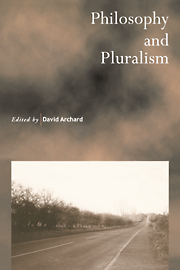Book contents
- Frontmatter
- Contents
- Notes on Contributors
- Introduction
- Philosophy in Different Cultural Contexts
- A Case for Philosophical Pluralism: The Problem of Intentionality
- William James, ‘A Certain Blindness’ and an Uncertain Pluralism
- Cultural Realism: the ancient philosophical background
- Religion and Pluralism
- A Single True Morality? The Challenge of Relativism
- Pluralism, Realism and Truth
- Value-Pluralism
- Moral Philosophy and its Anti-pluralist Bias
- Coping with the Many-Coloured Dome: Pluralism and Practical Reason
- Rawlsians, Pluralists, and Cosmopolitans
- Political Liberalism, Secular Republicanism: two answers to the challenges of pluralism
- ‘Race’ in Britain and the Politics of Difference
- Tragedy, Moral Conflict, and Liberalism
- References
Religion and Pluralism
Published online by Cambridge University Press: 30 October 2009
- Frontmatter
- Contents
- Notes on Contributors
- Introduction
- Philosophy in Different Cultural Contexts
- A Case for Philosophical Pluralism: The Problem of Intentionality
- William James, ‘A Certain Blindness’ and an Uncertain Pluralism
- Cultural Realism: the ancient philosophical background
- Religion and Pluralism
- A Single True Morality? The Challenge of Relativism
- Pluralism, Realism and Truth
- Value-Pluralism
- Moral Philosophy and its Anti-pluralist Bias
- Coping with the Many-Coloured Dome: Pluralism and Practical Reason
- Rawlsians, Pluralists, and Cosmopolitans
- Political Liberalism, Secular Republicanism: two answers to the challenges of pluralism
- ‘Race’ in Britain and the Politics of Difference
- Tragedy, Moral Conflict, and Liberalism
- References
Summary
The fact of a religiously plural world is one that is readily acknowledged by believers and non-believers alike. For religious believers, however, this fact poses a set of problems. Religions, at least most of the world's great religions, seem to present conflicting visions of the truth and competing accounts of the way to salvation. Faced with differing accounts of God in Judaism, Buddhism, Islam or Hinduism, what, for example can the Christian claim for the truth of Christian beliefs about God? John Hick, reflecting on the phenomenological similarity of worship in some of the great religious traditions, asks ‘whether people in church, synagogue, mosque, gurdwara and temple are worshipping different Gods or are worshipping the same God?’ (Hick and Hebblethwaite, 1980, p. 177). He rejects two possible answers to this question: that there exist many Gods, or that one religion, for example Christianity, worships the true God while all other religions worship false gods, which exist only in their imaginations. His favoured response is one that underpins his recent attempts to establish an account of religious pluralism, with which to oppose claims of religious absolutism and exclusivism:
(T)here is but one God, who is maker and lord of all; that in his infinite fullness and richness of being he exceeds all our human attempts to grasp Him in thought; and that the devout in the various great world religions are in fact worshipping that one God, but through different, overlapping concepts or mental images of him.
(Ibid. p. 178)- Type
- Chapter
- Information
- Philosophy and Pluralism , pp. 61 - 72Publisher: Cambridge University PressPrint publication year: 1996

